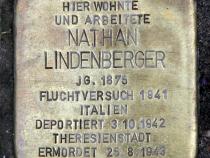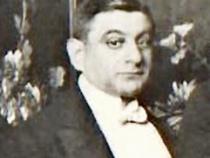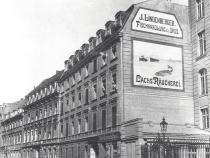Location
Otto-Braun-Straße ca. 72 - 74 --> Otto-Braun-Straße ca. 72 -74
District
Mitte
Stone was laid
20 September 2013
Born
20 June 1875 in Labiau/ Polessk
Escape
1941 Fluchtversuch nach Italien
Deportation
on 03 October 1942
to
Theresienstadt
Murdered
25 August 1943 in Theresienstadt
Nathan Lindenberger was the second son of Isaak Lindenberger. He never
married but remained in the family home (also the site of the Lindenberger
business's Kühlhalle) to take care of his aging father and to manage the
business after his father could no longer do so. This business was centered
around the smoking of salmon, which took place in the Kühlhalle; the latter
was also used to make ice, which was distributed throughout Berlin before
refrigeration became common. Financial troubles started during the
Depression, and Nathan was forced to borrow money from Jewish friends and
from relatives in the United States. His letters indicated, as best they
could under censorship, that he was desperate to get himself and his father
and youngest sibling, Lotte, to America. In early 1940 the three set out for
a voyage from Genova to New York. They had to break up the trip in Munich,
but the only hotel that admitted Jews was full and they were told to sleep on
the lobby floor. The father, who suffered from dementia, became hysterical,
and his two children decided to send him back to Berlin with Nathan and allow
Lotte to continue on to the United States, where she lived until 89. Nathan
cared for his father, who died the following year at 92. It was known that,
years before, he was acquainted with Wolf-Heinrich von Helldorff, police
president of Berlin, who, from accounts by a non-Jewish, was likely
blackmailing him. Nathan regularly had this employee make payments to
representatives of Helldorff in return for protection, but the latter ended
after his niece, Hanni Lindenberger Meyer, was arrested (and later executed)
for treason as a member of the secret Herbert Baum Gruppe. Nathan was sent
to Theresienstadt a few months after Hanni's arrest and was unable to get the
medicines he needed. He died a "natural death" at the camp.
married but remained in the family home (also the site of the Lindenberger
business's Kühlhalle) to take care of his aging father and to manage the
business after his father could no longer do so. This business was centered
around the smoking of salmon, which took place in the Kühlhalle; the latter
was also used to make ice, which was distributed throughout Berlin before
refrigeration became common. Financial troubles started during the
Depression, and Nathan was forced to borrow money from Jewish friends and
from relatives in the United States. His letters indicated, as best they
could under censorship, that he was desperate to get himself and his father
and youngest sibling, Lotte, to America. In early 1940 the three set out for
a voyage from Genova to New York. They had to break up the trip in Munich,
but the only hotel that admitted Jews was full and they were told to sleep on
the lobby floor. The father, who suffered from dementia, became hysterical,
and his two children decided to send him back to Berlin with Nathan and allow
Lotte to continue on to the United States, where she lived until 89. Nathan
cared for his father, who died the following year at 92. It was known that,
years before, he was acquainted with Wolf-Heinrich von Helldorff, police
president of Berlin, who, from accounts by a non-Jewish, was likely
blackmailing him. Nathan regularly had this employee make payments to
representatives of Helldorff in return for protection, but the latter ended
after his niece, Hanni Lindenberger Meyer, was arrested (and later executed)
for treason as a member of the secret Herbert Baum Gruppe. Nathan was sent
to Theresienstadt a few months after Hanni's arrest and was unable to get the
medicines he needed. He died a "natural death" at the camp.






